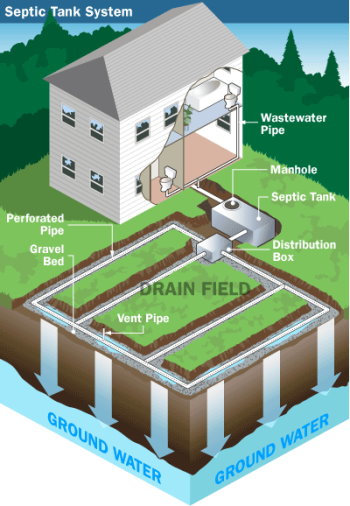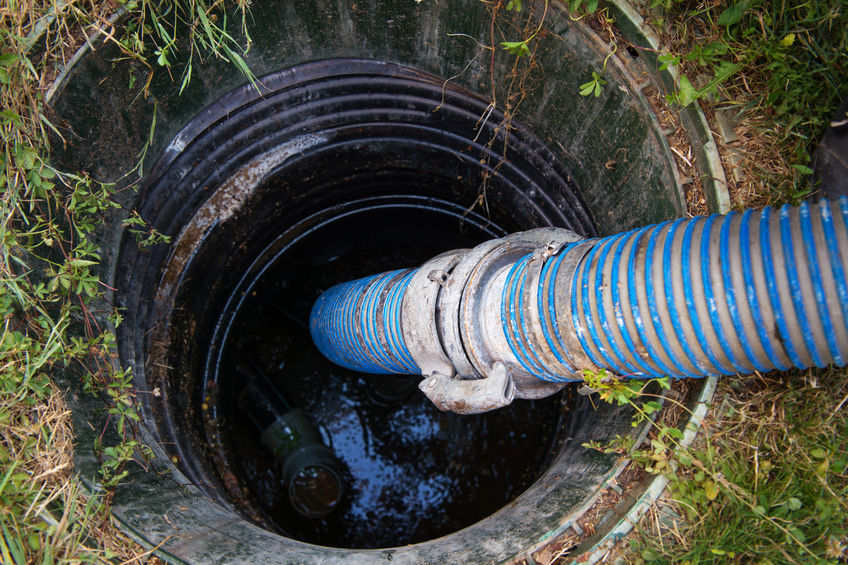Professional Septic Tank Cleaning in NJ
Frequent septic tank cleaning in New Jersey is critical to ensure your septic tank performs at its best potential. A septic system is designed in such a way that water passes on to the soil treatment area, while solids stay in the treatment tank. With time, sludge and scum accumulate in the septic tank, leaving the solids with little settling capacity. Due to this, the solids breach the water portion and escape into the soil treatment area. This process clogs the septic tank’s distribution lines, leading to serious often hard to reverse problems. Such difficulties can only be solved through regular cleaning.
The advantages of doing regular septic tank maintanence include:
-
Avoid Maintenance Emergencies
Doing regular septic tank inspections helps avoid maintenance emergencies because it enables you to identify issues and handle them before they become severe. If you are not able to spot and fix these complications early enough, they could lead to serious and costly damage to your septic tank.
-
Enhance Home Value
If you are planning to sell your house any time soon, doing frequent cleanings can be essential as they help boost the value of your home. If you happen to identify any problems during maintenance, you can always handle them early to make sure your system functions properly. A well-functioning septic tank system is a great asset in your home. Furthermore, if you are able to provide reports showing your system is maintained frequently, this can help increase your home’s value.

-
Avoid Bad Home Purchases
If you are going to buy a home with a septic system, doing an inspection before purchasing it is of utmost importance. Doing this gives you the peace of mind that you will not run into any issues in the future. In case your inspector identifies a problem, it can be handled before you purchase to avoid wastage of money. If serious problems are found, you will not be saved from a bad purchase but this also signals there may be other aspects of the house that need inspection as well.
-
Promote Better Performance
Maintaining your septic tank regularly not only helps to avoid serious problems in the future but also ensures your system performs in the best way possible. As long as you give your tank the care it needs, it will run better and serve you longer.
Septic Tank Cleaning Benefits
 If not regularly cleaned, the waste and water that goes down your septic tank could have a profound impact on your family’s health and finances. However, having a professional do septic tank cleaning on a regular basis can help you save a lot of money in the future and ensure your family’s health is secure.
If not regularly cleaned, the waste and water that goes down your septic tank could have a profound impact on your family’s health and finances. However, having a professional do septic tank cleaning on a regular basis can help you save a lot of money in the future and ensure your family’s health is secure.
Frequent septic tank cleaning is essential because during the process, your septic professional could notice minor issues that need addressing before growing into serious problems. Furthermore, cleaning your septic tank occasionally helps eliminate excess buildup inside the tank. Doing this enables sludge and solids to break down as designed and prevents hazardous materials from passing into the septic tank.
The Importance of Cleaning your Septic Tank Occasionally
Regardless of the size of your septic tank, you have to clean it regularly to make sure that it works effectively and lasts long. Here are some good reasons why you should schedule a septic tank cleaning soon.
-
Good Health
A septic tank that is improperly maintained might lead to great health risks associated with inadequately treated wastewater and harmful solids and other components left on your yard. A neglected tank could cause backwash flow, introducing bacteria into your house.
-
Financial Savings
Cleaning and maintaining your septic is less expensive compared to replacing it altogether. As aforementioned, during the cleaning process, your professional can examine signs of structural damage and advice you on how to deal with them before they result to a huge problem.
-
Property Value
If you fail to clean your septic tank, your house could lose value because it shows that your whole house has not been maintained properly over the years. This could potentially make you lose a good sale.
Septic Tank Pumping
Pumping is an essential part of septic tank cleaning and maintenance as it helps prevent solids from clogging soil pores after escaping into the drain field. Although pumping frequency depends on how often the tank is used, we recommend that septic systems be pumped at least once every three years for households without garbage disposals. However, if the septic system has a garbage disposal, it should be pumped every year.
Many homeowners believe that if they have not had any problems with their septic system, they do not have to pump their tank. This is a serious misconception because as long as the system is used, materials settle at the bottom, forming sludge. Other materials like grease will float as scum. Properly designed septic tanks usually have the capacity to hold sludge for up to five years. More accumulation means that sewage will have less time to settle properly, a problem that could potentially cause backwash.
What Will Cause your Septic System to Fail?
As you have already seen, maintaining your septic system is critical for its long-term effectiveness. If you want to keep your septic system in good condition at all times, knowing what to avoid is very important. This part of the article will look at leading causes of septic tank failures.
-
Lack of Maintenance
As aforementioned in this article, inspecting and maintaining your septic tank system on a regular basis is key for its ongoing performance. Most households schedule a septic inspection every 2 years and have their septic tank pumped out after 3 to 5 years. If you fail to maintain your septic system, small problems will become massive and possibly lead to failure.
-
Poor Construction
When a septic system is designed or installed improperly, it is likely to fail from the onset. Common septic system construction problems include inadequate sizing, installation in impermeable soil, thin soil layers, and poor construction. Such problems are likely to cause the failure of your system later on.
-
Physical Damage
If too much pressure is placed on the soil over the septic system, this could compact the soil or crush pipes. Common causes of this problem are doing construction over the system, driving, or parking. Moreover, tree roots can also lead to damage of the system. Therefore, consider planting shrubs and grass instead of trees around your septic tank area.
-
An Overload Water System
If a household generates more water than what its septic tank is designed for, this could cause sewage to back up into the home or seep up to the soil’s surface. The liquid must obviously go somewhere if there is too much water inflow. Having leaky toilets, performing regular loads of laundry, or running multiple appliances at one time can overload the septic tank, leading to the failure of the whole system.
Septic Tank Do’s and Don’ts
 Do’s
Do’s
-
Inspect your Septic Tank Regularly
Remember to have your septic tank inspected at least once every year. Inspection is critical as it shows whether you need to clean more or less often. Understanding this will help you work on small problems that could cause serious issues later on. The proper care and maintenance of your septic tank can save you thousands of dollars in repair and replacement costs.
Even a good system must be pumped out periodically. The frequency depends on the size of the septic system and the use it gets. Most systems should be pumped out every one to three years. Older systems and larger families (heavier usage) should be pumped more often. This can increase the longevity of your system, stop the pollution of your land and prevent the contamination of your water. When was the last time you had your septic tank serviced? Don’t neglect it any longer!
-
Pump your Septic Tank When Need Be
You should not wait until you have a problem pumping out your septic tank. Pumping on a routine basis assists to prevent system failures. If you cannot recall when you last pumped, your septic tank might be living on borrowed time.
-
Practice Water Conservation
The less wastewater produced, the lesser strain placed on your system. By reducing the amount of water your household uses, you can extend the life of your tank and minimize the possibility of system failure.
-
Keep Accurate Records
It is important to keep a record of your septic tank’s maintenance because it helps you understand your system and assists you to identify important future dates on when to do upgrades to your tank.
Don’ts
Apart from avoiding putting fats, grease, motor oils, fuels, disposable diapers, paper towels, paints, or chemicals into your septic system, here are more don’ts that will help maintain your septic tank.
-
Keep Traffic Away from your Drain Field
You should not place vehicles or heavy equipment over your septic tank system because the pressure released can compact the soil or lead to damage of the system pipes. Moreover, you should not plant a garden or construct a pool close to the tank before getting approval from the health department.
-
Grass Provides the best Cover for your Septic System
You should not place impermeable materials over your system. This is because concrete, plastic, and asphalt deter oxygen from getting into the soil. Bacteria require oxygen to break down the sewage.
-
Do not use a Garbage Disposal
A garbage disposal adds grease and solids into your septic system, causing the need to do frequent cleanings.
-
Do not Poison your Septic Tank
Septic tank poisoning takes place when drain cleaners, paint solvents, polishes, coating, or toilet bowl cleaners destroy essential bacteria and contaminate surface and ground water. We recommend that you do not use any harsh chemicals in your system such as: Sulfuric acid, lye, Liquid Plumber, Draino and caustic sodas.
Do not dispose of cooking grease or paints into your drains. Also, we recommend that you do not flush paper towels, napkins, sanitary products, cigarettes, baby wipes or kitty litter into your septic system.When using laundry detergents, biodegradable and liquid detergents are better for your system. In toilet paper, white single-ply is suggested for best care of your septic system.
-
Keep Runoffs Away from the System
Water from driveways, roofs, and patios overwhelms your septic system, leading to irreversible damage.
-
Do not Dispose Water from Hot Tubs into the Tank
Large water volumes overload the system while disinfectants in the water destroy important bacteria.
-
Never Enter a Septic Tank
If you are not an experienced professional, you should not think about getting into your septic tank. You could suffer a lack of oxygen or inhale poisonous gases.
-
Do Not Use Septic Additives Frequently
Additives come with short-term advantages, but might cause long-term problems. Furthermore, using these products continually does not reduce the need for occasional pumping.
-
Do not Lean Over the Tank Opening
You should never lean over an open septic tank as the gases emitted could knock you down, causing a fatal accident.
-
Do not Ignite Flames Close to a Septic Tank
Contents of your septic tank could emit methane gas, which is explosive. Thus, you should keep lit cigarettes and brush fires away from the tank.
Conclusion
Studies show that it costs anywhere between $5,000 and $15,000 to replace an average septic tank depending on the complexities involved. Paying attention to these figures, it is evident that septic tank cleaning, inspection, and overall maintenance is of utmost importance to keeping it up-and-running. Routine inspection and maintenance not only saves you from spending a lot of money on expensive repairs, but also makes your homestead a healthy and safe place to reside in.
The good thing is that maintaining your septic system is not a tough thing to do. From your garbage disposal to your toilet, shower, and washer, you should realize that anything that you pass down the drain ends up in your septic tank. Hence, it is critical to pay high regard to the items you put through your septic system, and the effectiveness of your appliances. This article has provided you with all you need to know about septic tank cleaning and inspection. If you need help with your septic tank, consider contacting a professional today.
Senior citizen discounts are available. We offer our customers a free bacteria treatment. Simply mention “FREE BACTERIA TREATMENT” in your comments box on the contact form. Contact us for a free estimate.
